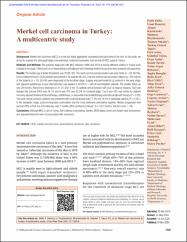Merkel cell carcinoma in Turkey: A multicentric study

Göster/
Erişim
info:eu-repo/semantics/openAccessAttribution-NonCommercial-ShareAlike 4.0 Internationalhttps://creativecommons.org/licenses/by-nc-sa/4.0/Tarih
2021Yazar
Yıldız, FatihDemirci, Umut
Küçükarda, Ahmet
Büyükşimşek, Mahmut
Sakalar, Teoman
Öztürk Topçu, Türkan
Aslan, Ferit
Tufan, Gülnihal
Aydın, Övgü
Turna, Hande
Akgül Babacan, Nalan
Başoğlu, Tugba
Kurt, Bediz
Yıldız, Birol
Eren, Tülay
Demiray, Atike Gökçen
Gümüşay, Özge
Arslan, Çağatay
Özdemir, Nuriye
Ürün, Yüksel
Baykara, Meltem
Turan, Nedim
Uysal, Mükremin
Bilici, Ahmet
Kavgacı, Halil
Çiçin, İrfan
Kılıçkap, Saadettin
Paydaş, Semra
Üst veri
Tüm öğe kaydını gösterKünye
Yıldız, F., Demirci, U., Küçükarda, A., Büyükşimşek, M., Sakalar, T. Öztürk Topçu, T. ... Paydaş, S. (2021). Merkel cell carcinoma in Turkey: A multicentric study. Journal of Cancer Research and Therapeutics, 17(6), 1525-1529. https://dx.doi.org/10.4103/jcrt.JCRT_950_19Özet
Background: Merkel cell carcinoma (MCC) is a rare but highly aggressive neuroendocrine carcinoma of the skin. In this study, we aimed to evaluate the clinicopathologic characteristics, treatment outcomes, and survival of MCC cases in Turkey. Materials and methods: The patients diagnosed with MCC between 1999 and 2018 at twenty different centers in Turkey were included in the study. Patient and tumor characteristics and adjuvant and metastatis treatment outcomes were analyzed retrospectively. Results: The median age of totally 89 patients was 70 (26-93). The most common primary location was lower limbs (n = 29, 32.5%). Immunohistochemically, CK20 positivity was present in 59 patients (66.3%). Only two patients had secondary malignancy. The majority of the patients (n = 76, 85.4%) were diagnosed at the localized stage. Surgery was performed for all patients in the early stage, and adjuvant radiotherapy or/and chemotherapy was applied to 52.6% (n = 40) of nonmetastatic patients. The median follow-up was 29 months. Recurrence developed in 21 (27.6%) of the 76 patients who presented with local or regional disease. Two-year disease-free survival (DFS) was 68.1% and 5-year DFS was 62.0% for localized stage. The 5-year DFS was similar for patients receiving adjuvant treatment (chemotherapy, radiotherapy, or sequential chemoradiotherapy) and without adjuvant therapy (P > 0.05). Two-year overall survival in patients who presented with localized disease was 71.3% and 18.5% in metastatic patients (P < 0.001). In the metastatic stage, platinum/etoposide combination was the most preferred combination regimen. Median progression-free survival (PFS) in first-line chemotherapy was 7 months (95% confidence interval: 3.5-10.5 months; standart error: 1.78). Conclusions: Although MCC is rare in Turkey, the incidence is increasing. Gender, CK20 status, tumor size, lymph node involvement, and adjuvant treatment were not associated with recurrence.
WoS Q Kategorisi
Q4Scopus Q Kategorisi
Q3Kaynak
Journal of Cancer Research and TherapeuticsCilt
17Sayı
6Koleksiyonlar
- Makale Koleksiyonu [3811]
- PubMed İndeksli Yayınlar Koleksiyonu [4281]
- Scopus İndeksli Yayınlar Koleksiyonu [6647]
- WoS İndeksli Yayınlar Koleksiyonu [6721]


















